 |
|
 15 September 2014, 19:26
15 September 2014, 19:26
|
#21
|
|
Member
Country: UK - England
Town: Hampshire
Boat name: Altea 2
Make: Narwhal
Length: 5m +
Engine: 90 Mariner
Join Date: Aug 2011
Posts: 855
|
Quote:
|
Originally Posted by Landlockedpirate
I actually tried a 3.5T version from a firm somewhere near Southampton. Very very effective, load stopped easily and the trailer was rock solid even under a heavy right foot
|
RM Trailers?
|

|

|
 15 September 2014, 20:30
15 September 2014, 20:30
|
#22
|
|
Member
Country: UK - England
Town: St Helens
Boat name: Wine Down
Make: Maxum
Length: 8m +
Engine: Inboard
Join Date: Apr 2012
Posts: 934
|
Quote:
Originally Posted by Trailer Guy

RM Trailers?
|
It might have been, but it was nearly 20 years ago !
It was a fantastic piece of kit, just very complicated (compared to the usual over run arrangement) and when I realised I would never be able to buy a new car, that was the end of that.
__________________
|

|

|
 16 September 2014, 10:55
16 September 2014, 10:55
|
#23
|
|
Member
Country: UK - England
Town: Hampshire
Boat name: Altea 2
Make: Narwhal
Length: 5m +
Engine: 90 Mariner
Join Date: Aug 2011
Posts: 855
|
They did a load for the military. Froggies had a few air braked ones, down in Poole. Solid bit of kit.
Another company that became victims of the EU type approval regs, so I was informed. Shame.
|

|

|
 16 September 2014, 11:52
16 September 2014, 11:52
|
#24
|
|
Member
Country: UK - Scotland
Boat name: Wildheart
Make: Humber/Delta Seasafe
Length: 5m +
Engine: Merc 60 Clamshell
MMSI: 235068449
Join Date: Apr 2007
Posts: 4,671
|
I may be wrong here and I am open to correction, but I think the whole idea of the 1950s tech overrun brake is that (lack of maintenance notwithstanding) it is pretty much guaranteed to work.
As soon as you introduce electrics through a connector you then instantly introduce a dozen or so potential failure modes - things like corroded terminals etc down to "I forgot to plug it in". - Lack of lights coz the hitcher-up-erer got distracted is dangerous enough, but could you imagine the fallout of a 3T trailer with no brakes? - or if you "failesafe" thwem the brakes banging on on the m'way as the connection fails?
Yes, you can engineer all this stuff out, but we would be wandering into deadman territory - we all know the dodgy trailers out there already - add a load of expensive tech and guess what.....
Also - we are moaning here about our simple mechanical systems failing 'coz they go swimming.... you can probably guess where that thought is going! 
__________________
|

|

|
 02 October 2014, 17:55
02 October 2014, 17:55
|
#25
|
|
Member
Country: UK - England
Join Date: Aug 2013
Posts: 170
|
Electric brakes are not illegal in the UK, it's just that the methods for applying them are generally not allowed.
In the USA, a brake controller mounted in the cabin of the towing vehicle controls braking power on the trailer and also allows the trailer to be braked independently of the towing vehicle. There is normally a sensor in the towing vehicle to sense deceleration and transmit this information to the brake controller to apply the trailer brakes.
In the UK, legislation states that the trailer brakes must be capable of being applied without the driver removing their hands from the steering wheel. Also, the device used for measuring deceleration in order to determine the braking force required must be mounted on the trailer. The electrical power supply for the trailer braking system must be fed directly from the towing vehicle. If the trailer braking system has a battery, it must be disconnected while the brakes are being applied.
Some American trailers use a +12v signal from the brake light wiring in order to start the braking on the trailer. In the UK, braking force on all axles must reach the level required by legislation within 600ms of the driver applying the brakes in the towing vehicle and waiting for the signal from the lights may cause this time limit to be exceeded.
If a UK trailer is fitted with brakes, the brakes must be on all wheels. Also, regardless of which type of braking system it has, there must be a purely mechanical parking brake which is capable of holding the trailer on an 18% gradient.
Just as a side note, the Land Rover Defender can tow up to 4000kg if fitted with close coupled brakes. LRSV do an air brake system for just this purpose and I've seen an air brake converted Ifor Williams trailer before.
The reason why we are still using the mechanical overrun brake on our trailers is because it's foolproof and providing it is well maintained, it will always 'just work' and it's fail safe. It doesn't require any electrical interface with the vehicle, and the braking effort on the trailer is always proportional to that of the towing vehicle. Since it's purely mechanical it is not susceptible to electrical faults or failure. If you need to stop suddenly, jam the anchors on and the trailer does the same. If for some reason the trailer detaches or you're in an accident and the connection between the vehicle and trailer is lost, the breakaway cable fully applies the brakes on the trailer and it comes to a stop. Very simple.
__________________
|

|

|
 03 October 2014, 07:49
03 October 2014, 07:49
|
#26
|
|
Member
Country: USA
Town: NorCal
Boat name: SHARKY
Make: AB
Length: 4m +
Engine: Honda BF75 & BF5
Join Date: Dec 2009
Posts: 2,122
|
Quote:
Originally Posted by tehguy

Electric brakes are not illegal in the UK, it's just that the methods for applying them are generally not allowed.
|
Here in the USA we can have both electric or hydraulic brakes on a small trailer. Some are drum, and the rest are disk brakes.
Quote:
Originally Posted by tehguy

In the USA, a brake controller mounted in the cabin of the towing vehicle controls braking power on the trailer and also allows the trailer to be braked independently of the towing vehicle.
|
Yes for electric brakes, and it works very effectively. That is what all the livestock trailers I have used and own do. If the trailer gets in a skid you can blip the trailer brakes on to swing it back behind the tow vehicle. You can also adjust how much braking you want. It is the most common type of braking system for travel type RV trailers, and car trailers. Hydraulic surge brakes are more common for smaller trailers like typically used under boats.
Quote:
Originally Posted by tehguy

There is normally a sensor in the towing vehicle to sense deceleration and transmit this information to the brake controller to apply the trailer brakes.
|
That is all part of the brake controller. My favorite controller is a Tekonsha P3.
Tekonsha - P3®
Quote:
Originally Posted by tehguy

In the UK, legislation states that the trailer brakes must be capable of being applied without the driver removing their hands from the steering wheel.
|
Which both the electric brakes or hydraulic surge brakes do as they are seamless, and require no input from the driver to function. The brake controller automatically applies the brakes on electric brakes, and the master cylinder mounted in the trailer dictates how much braking to apply to the trailer.
Quote:
Originally Posted by tehguy

Also, the device used for measuring deceleration in order to determine the braking force required must be mounted on the trailer.
|
The brake controller is mounted under the tow vehicles dash within easy access, or now they are often integrated into the tow vehicle. This only applies to electric brakes.
Quote:
Originally Posted by tehguy

The electrical power supply for the trailer braking system must be fed directly from the towing vehicle. If the trailer braking system has a battery, it must be disconnected while the brakes are being applied.
|
I haven't personally worked on a vehicle with electric trailer brakes and a battery system, but they do exist. Our livestock trailers do use the center power supply but it is completely independent of the braking system. I see no reason you couldn't be charging your trailer battery and using the brakes at the same time.

Quote:
Originally Posted by tehguy

Some American trailers use a +12v signal from the brake light wiring in order to start the braking on the trailer.
|
Not that I have ever seen. Not our farm equipment, nor any of my boat trailers.
The reverse light power feed is used to cut disk brakes loose while backing up, or it is next to impossible as they will lock up if pushing uphill. Disk equipped trailers also can use a piece of metal (Coins work) to manually disengaged the brakes.
Quote:
Originally Posted by tehguy

In the UK, braking force on all axles must reach the level required by legislation within 600ms of the driver applying the brakes in the towing vehicle and waiting for the signal from the lights may cause this time limit to be exceeded.
|
Since we are talking boats here, lets just assume the USA hydraulic brake system is standard, at which point as soon as the master engages from the pressure in the trailer tongue pushing forward, the brakes are being applied. With that said, the electrical signal is probably 10 times faster.
Quote:
Originally Posted by tehguy

If a UK trailer is fitted with brakes, the brakes must be on all wheels. Also, regardless of which type of braking system it has, there must be a purely mechanical parking brake which is capable of holding the trailer on an 18% gradient.
|
We can put brakes on 2-6 wheels depending on how many wheels the trailer has. Our parking brakes are purely mechanical, and although I have never tested my rock on an 18% grade it does quite well on my steep driveway, and has reliably held my boat there for years. Otherwise my anchor has served duty to hold the boat trailer on a steep hill when I have needed to disconnect. I will agree a mechanical parking brake would be nice to have.
Quote:
Originally Posted by tehguy

Just as a side note, the Land Rover Defender can tow up to 4000kg if fitted with close coupled brakes. LRSV do an air brake system for just this purpose and I've seen an air brake converted Ifor Williams trailer before.
|
Most full size trucks 3/4ton+ here in the USA are rated to tow 12,000lbs (5443kg), no air brakes needed as that requires a different drivers license. Our trailer braking systems work very well without going to air brakes.
Quote:
Originally Posted by tehguy

The reason why we are still using the mechanical overrun brake on our trailers is because it's foolproof and providing it is well maintained, it will always 'just work' and it's fail safe.
|
As do hydraulic brakes or EVERY vehicle today wouldn't be on the road.
Quote:
Originally Posted by tehguy

It doesn't require any electrical interface with the vehicle, and the braking effort on the trailer is always proportional to that of the towing vehicle.
|
As are hydraulic trailer brakes 100% mechanical. The trailer tongue push against the ball is what sets the pressure applied.
Quote:
Originally Posted by tehguy

Since it's purely mechanical it is not susceptible to electrical faults or failure. If you need to stop suddenly, jam the anchors on and the trailer does the same.
|
Hydraulic does the same, and DISK brakes just happen to do it better than drum! Ever smoked a drum brake setup? I have pushed my K2500 Suburban to the limits towing on steep winding roads, and my disk boat trailer brakes did their share of the work stopping us without overheating. Disk brakes are where it is at 
Quote:
Originally Posted by tehguy

If for some reason the trailer detaches or you're in an accident and the connection between the vehicle and trailer is lost, the breakaway cable fully applies the brakes on the trailer and it comes to a stop. Very simple.
|
Same with hydraulic brakes. Just make sure on both setups the cable for the brakes is in good shape.
__________________
|

|

|
 03 October 2014, 10:37
03 October 2014, 10:37
|
#27
|
|
Member
Country: UK - Isle of Man
Town: Douglas
Length: no boat
Join Date: Aug 2006
Posts: 339
|
Elxis Trailers in Greece do disc brakes. I had one for my Humber OP 6.3 and it was fantastic, no corrosion problems, easy to inspect and great braking, what more could you want. The trailer was beautifully manufactured also, with oval tubing and well galvanised. We need an importer in UK.
Don't know if it meets the DOT requirements though.
__________________
|

|

|
 16 October 2014, 14:03
16 October 2014, 14:03
|
#28
|
|
Member
Country: UK - England
Join Date: Aug 2013
Posts: 170
|
I'm sure there are reasons why the electrical supply must come from the vehicle during braking and not the trailers own battery, but I'm not the one who writes the legislation so I don't know.
There are 2 types of electrical interface socket used on vehicles in the UK, the old 12N and 12S sockets, and the newer European 13 pin socket. The 12N socket does the essential lighting - indicators, brake, tail lights and fog light. The 12S socket is normally fitted alongside the 12N socket, and it purely for caravans as it provides a feed for reversing light, battery charging, and fridge electric.
The European 13 pin socket combines the two in a much better designed socket, with a twist fit locking mechanism which is watertight. It's the defacto standard for caravans now and a lot of other trailers are using it too, for example I hired a car transporter a few months ago and it had the 13 pin system rather than 12N. The 13 pin socket does however have 1 pin which is currently unused, so this could be use for electric braking in the future.
The short of it all is there is no electric trailer braking in the UK. They've never been used here, everything is on overrun brakes. Yes some people import trailers from the USA (especially ones that come with boat purchases) but generally they'll either have the trailer fitted with an overrun mechanism or they'll buy a suitable American tow vehicle. I can't see there being a big switch over any time soon, personally I wouldn't mind but I think things are good the way they are now. The overrun brake has its drawbacks, but overall it's simple and it'll always "just work".
__________________
|

|

|
 18 October 2014, 01:44
18 October 2014, 01:44
|
#29
|
|
Member
Country: USA
Town: NorCal
Boat name: SHARKY
Make: AB
Length: 4m +
Engine: Honda BF75 & BF5
Join Date: Dec 2009
Posts: 2,122
|
Quote:
Originally Posted by tehguy

Yes some people import trailers from the USA (especially ones that come with boat purchases) but generally they'll either have the trailer fitted with an overrun mechanism or they'll buy a suitable American tow vehicle.
|
For a boat trailer with hydraulic disk brakes all you need is a ball to tow the boat and you can drive forward all day long. You can even backup as long as the trailer is not pushing on the tow vehicle. And with a 5 pin connector wired in, when the tow vehicle is put in reverse the solenoid is engaged so you can backup. Very easy to wire the vehicle. ANY VEHICLE rated to tow the weight can tow a USA boat trailer. The system is 100% mechanically engaged, and our braked trailers are required to have a breakaway engagement too. That way if the tow vehicle and trailer go two separate ways the trailer brakes are automatically engaged. This is separate of the chain/cables between the trailer and tow vehicle. The solenoid is only for backing up, everything else is mechanical utilizing hydraulics.
Trailer brake away cable shown below attached to top of master cylinder in tongue.
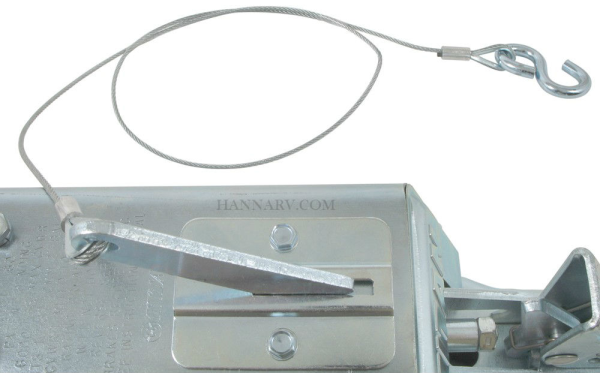
Electric brakes are generally used on larger trailers IE: camping trailers, livestock trailers etc, with the next step being air brakes on big rigs. Pretty much all small trailers are hydraulic surge brakes, if they have any brakes at all.
__________________
|

|

|
 18 October 2014, 19:18
18 October 2014, 19:18
|
#30
|
|
Member
Country: USA
Town: Oakland CA
Length: 3m +
Join Date: Feb 2005
Posts: 6,653
|
To add to Pete's description, if you're using a 4-wire plug, you can usually disable the trailer brakes by either flipping a lever or blocking the actuator. In the lever case, it usually resets as soon as pressure is released; I think the block has to be manually removed. Either one involves getting out and walking back to the trailer hitch, but it is still possible.
jky
__________________
|

|

|
 19 October 2014, 10:15
19 October 2014, 10:15
|
#31
|
|
Member
Country: Australia
Town: Sydney
Boat name: Lunasea
Make: Ribtec 890SX
Length: 8m +
Engine: Yamaha ME 421STI x 2
Join Date: Aug 2009
Posts: 472
|
In Australia almost all braked boat trailers use disk brakes.
They can be applied mechanically by a cable pulling levers on the calliper.
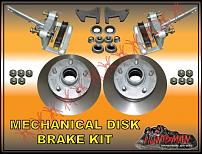
The cable is activated by the coupler. As the vehicle comes to a stop, the trailer pushes against the vehicle compressing the coupler which activates a lever. The lever has a cable that attaches to the levers on the callipers.
The coupler looks like this.
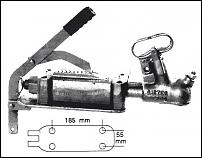
The cable attaches to the bottom hole of the lever on the left.
Another way to activate disc brakes is to use hydraulic callipers that are similar to a motor vehicle. The hydraulic master cylinder is activated by the coupler in a similar way to the cable brakes.
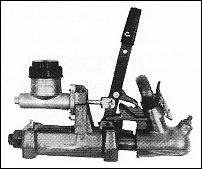
Hydraulic disc brakes can also be activated by an electric/hydraulic unit that is an electric hydraulic compressor that provides pressure to activate the disc brakes when it receives a signal from an in car controller. This is the US system referred to others.
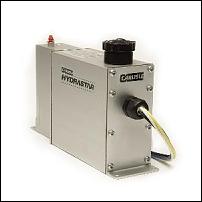
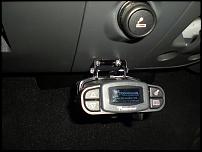
__________________
|

|

|
 19 October 2014, 10:36
19 October 2014, 10:36
|
#32
|
|
Member
Country: UK - England
Town: gloucestershire
Length: 4m +
Join Date: Nov 2012
Posts: 342
|
^^^ The second photo down of the hitch looks like something from the 1960/70's my father used to have on his trailer . When he wanted to reverse I had to jump out of the car ,hold a lever over on the hitch and put a metal peg/pin in position ,this held the brakes off !, so he could reverse . All good fun when you are a kid !. 
Interesting to see whats used around the world, my take is we are way behind here (uk) .
__________________
|

|

|
 19 October 2014, 11:04
19 October 2014, 11:04
|
#33
|
|
Member
Country: Australia
Town: Sydney
Boat name: Lunasea
Make: Ribtec 890SX
Length: 8m +
Engine: Yamaha ME 421STI x 2
Join Date: Aug 2009
Posts: 472
|
That's exactly what you have to do to reverse.
__________________
|

|

|
 19 October 2014, 19:44
19 October 2014, 19:44
|
#34
|
|
Member
Country: USA
Town: NorCal
Boat name: SHARKY
Make: AB
Length: 4m +
Engine: Honda BF75 & BF5
Join Date: Dec 2009
Posts: 2,122
|
Which is exactly why a solenoid is used, so you don't have to get out of the vehicle. The 5th "Blue" wire is the reverse solenoid.

Since I kept the Correct Craft in a locker and used a tractor launch service while it was stored there, the mechanical bypass lockout for the brakes was semi permanently installed with a zip tie.

Quote:
Originally Posted by kubcat

Hydraulic disc brakes can also be activated by an electric/hydraulic unit that is an electric hydraulic compressor that provides pressure to activate the disc brakes when it receives a signal from an in car controller. This is the US system referred to others.
|
Not that I have ever seen. They are either a mechanical hydraulic, or full electric for recreational toy hauling trailers.
__________________
|

|

|
 19 October 2014, 19:49
19 October 2014, 19:49
|
#35
|
|
Member
Country: Australia
Town: Sydney
Boat name: Lunasea
Make: Ribtec 890SX
Length: 8m +
Engine: Yamaha ME 421STI x 2
Join Date: Aug 2009
Posts: 472
|
Petre_C, I have seen those in the US catalogues. We have very different plugs to the US but I am guessing wiring it up to the reverse lights circuit is the way to go.
__________________
|

|

|
 20 October 2014, 17:12
20 October 2014, 17:12
|
#36
|
|
Member
Country: UK - Scotland
Boat name: Wildheart
Make: Humber/Delta Seasafe
Length: 5m +
Engine: Merc 60 Clamshell
MMSI: 235068449
Join Date: Apr 2007
Posts: 4,671
|
Quote:
Originally Posted by camelgas

^^^ The second photo down of the hitch looks like something from the 1960/70's my father used to have on his trailer . When he wanted to reverse I had to jump out of the car ,hold a lever over on the hitch and put a metal peg/pin in position ,this held the brakes off !, so he could reverse . All good fun when you are a kid !. 
Interesting to see whats used around the world, my take is we are way behind here (uk) . |
Yep, been there, done that..... 
problem with them is you only need to forget to "un flip" it (we're all human!) and you potentially drive off with a couple of tons of unbrkaed trailer on your hitch.
Hence them being banned on new stuff here since forever ago! 
__________________
|

|

|
 |
|
 Posting Rules
Posting Rules
|
You may not post new threads
You may not post replies
You may not post attachments
You may not edit your posts
HTML code is Off
|
|
|
|
 Recent Discussions
Recent Discussions |
|
|
|
|
|
|
|
|
|
|
|
|
|
|
|
|
|
|
|
|
|
|
|
|
|
|
|
|
|
|
|
|
|